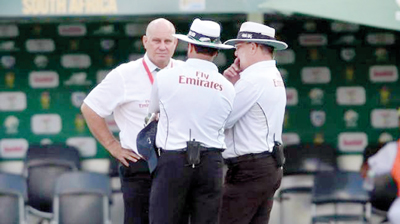Crime and punishment — the ICC way
View(s):
The picture shows when the match authorities called the players off the playing arena after a South African player was hit on the helmet by Indian fast bowler Bumrah during the India Test series.
Who said that cricket is waning as a game, while every day, its authorities keep pulling their hair (or what is left of it) to make it more appealing to the public, especially, to the guys who watch the idiot box for cricket action.
For the TV cricket pundit, it should be sharp and prompt, because the game that is captured is shown in minute detail, as far as the game is concerned. As a result, TV cricket analysts and commentators have become after-life heroes, even after shedding their pads and gloves. Thus the camera inning also has become a separate industry.
Among the more popular sports, I presume cricket is the game that is played for the longest duration. So, the pundits have introduced various other facets to make it more interesting, and thus, the 50-over and the T-20 were conceived and delivered. Yes, ploys worked and the result was the birth of money yielding programmes such as the IPL. Just imagine, in spite of it being a state-based tournament in India, it is by far the most lucrative.
Yet, the general human always seeks more or, to be precise, variety. At the same time, some others look for ways of stretching the extra yard and try to eke out a few dollars more. So, to police all these activities, the well respected cricketing gentry of yore came up with the International Cricket Council (ICC). So that, all these cricketing activity would be streamlined and worked within the norms of accepted cricketing rules laid down by them. But, time and again, cricketers of repute keep breaking these norms.
For instance, there was a time when the cricketing world did not know what ‘reverse swing’ was, until a bowler named Salim Mir, who turned out for Punjab, mastered it and passed the art on to his team mate Safraz Nawaz — a permanent member of Pakistan’s international cricket squad at that time.
Gradually, the magic spread and soon, bowlers of the calibre of Imran Khan, Wasim Akram and Waqar Younis took it to the world stage. But, were they the only ones? That was in the 1990s. But, way back in 1977, England’s fast-medium swing bowler John Lever bamboozled the Indians in India, with his Vaseline trick to gain unnatural advantage. In 1994, England skipper Michael Atherton kept dirt in his pocket and that became international news.
However, in 2001 and 2004, Indian legends Sachin Tendulkar and Rahul Dravid were also sent to the sin bin, after they were found guilty of ball-tampering while a match was in progress.
At that time, the cricket rule book only talked about Law 42.5, which stated, “No one shall run the ball on the ground or, take any other action to alter the condition of the ball”. (See Annexure 1)
So, as far as the cricket rule book is concerned, the laws are generally very clear on such situations and, to add to this, international cricket is also armed with another adjudicator who is known as the “ICC Match Referee”. In international cricket, ICC match referees also have their own sets of rules. These rules are related to players and match situations, and generally. If an offence is committed, punishments are meted out according to the gravity of the situation.
This is where the stigma lies. Of late, some of the crimes and punishments do not balance off as they should. For instance, what transpired during the Nidahas T-20 tournament. Lankan captain Dinesh Chandimal was banned for two T-20 games for slow overrate. Some felt that, even indirectly, it influenced the eventual outcome of the tournament. Sri Lanka ended up third best in a triangular played in Sri Lanka. Sri Lanka lost the opportunity to win a trophy put on offer to celebrate its 70th Anniversary of Independence.
This was followed by the ‘Naga Dance’ fracas that resulted in the Bangladesh captain Shakib ul Hasan calling his players back to the pavilion, inciting untoward incidents beyond the boundary line. After Bangladesh had beaten Sri Lanka in the final match play-off, they damaged the R. Premadasa pavilion glass door. Yet, the match referee saw this as a lesser offence than of Chandimal’s, and the Bangladeshi players involved in the fracas were only imposed a fine and given demerit points.
Then, in the controversial current series between Australia and South Africa, South African fast bowler Kagiso Rabada was handed a two-Test ban by match referee Jeff Crowe, for “inappropriate and deliberate physical contact with a player” (Later the ban was brought down to a one match ban).
 However, following a ball-tempering incident during the third Test, Australian captain Steven Smith and vice captain David Warner were even sent back home and, in all probability, it will be their last international for their country. Although Cricket Australia imposed a one year ban on them, the official ICC punishment was negligible and laughable.
However, following a ball-tempering incident during the third Test, Australian captain Steven Smith and vice captain David Warner were even sent back home and, in all probability, it will be their last international for their country. Although Cricket Australia imposed a one year ban on them, the official ICC punishment was negligible and laughable.
No wonder a majority of past international cricketers describe the ICC as a toothless tiger. How could a game thrive when its match referees, who are also past cricketers of repute, cannot decipher between the magnitude and impact of an offence. One such past cricketer even called in and asked me, “Are these guys getting too comfortable in their seats. The chief match referee should be given a kick a few soft butts and make them harder.”
Back in our own land, there was a hue and a cry when an influential band of ICC officials visited Sri Lanka and launched an investigation for “We don’t know what”, and more than five months on, still the investigations are ongoing. Meaning, the ICC is still undecided.
This is the sad state of the ICC today. We will not be surprised at all, if one of these days, a real habitual person of shady background would perch himself at the helm of this institution.
| (Annexure 1) However, the present MCC rule book on such situations reads as, “41.1- Fair and unfair play – responsibility of captains. The captains are responsible for ensuring that play is conducted within The Spirit of Cricket, as described in The Preamble – The Spirit of Cricket, as well as within the Laws. 41.2 Fair and unfair play – The umpires shall be the sole judges of fair and unfair play. If either umpire considers an action, not covered by the Laws, to be unfair he/she shall intervene without appeal and, if the ball is in play, call and signal Dead ball and implement the procedure as set out in 41.19. Otherwise umpires shall not interfere with the progress of play without appeal except as required to do so by the Laws. 41.3 The match ball – 41.3.1 The umpires shall make frequent and irregular inspections of the ball. In addition, they shall immediately inspect the ball if they suspect anyone of attempting to change the condition of the ball, except as permitted in 41.3.2. 41.3.2 It is an offence for any player to take any action which changes the condition of the ball. Except in carrying out his/her normal duties, a batsman is not allowed to willfully damage the ball. See also Law 5.5 (Damage to the ball). A fielder may, however 41.3.2.1 polish the ball on his/her clothing provided that no artificial substance is used and that such polishing wastes no time. 41.3.2.2 remove mud from the ball under the supervision of an umpire. 41.3.2.3 dry a wet ball on a piece of cloth that has been approved by the umpires. 41.3.3 The umpires shall consider the condition of the ball to have been unfairly changed if any action by any player does not comply with the conditions in 41.3.2. 41.3.4 If the umpires consider that the condition of the ball has been unfairly changed by a member or members of either side, they shall ask the captain of the opposing side if he/she would like the ball to be replaced. If necessary, in the case of the batting side, the batsmen at the wicket may deputise for their captain. 41.3.4.1 If a replacement ball is requested, the umpires shall select and bring into use immediately, a ball which shall have wear comparable to that of the previous ball immediately prior to the contravention. 41.3.4.2 Regardless of whether a replacement ball has been chosen to be used, the bowler’s end umpire shall
The umpires together shall report the occurrence as soon as possible after the match to the Executive of the offending side and to any Governing Body responsible for the match, who shall take such action as is considered appropriate against the captain, any other individuals concerned and, if appropriate, the team. 41.3.5 If the umpires agree that in the match there has been any further instance by that team of unfairly changing the condition of the ball, they shall 41.3.5.1 repeat the procedure in 41.3.4.1 and 41.3.4.2. If the further offence is committed by the fielding side, additionally the bowler’s end umpire shall 41.3.5.2 – direct the captain of the fielding side to suspend immediately from bowling the bowler who delivered the preceding ball; he/she shall not be allowed to bowl again in the match.
41.4 Deliberate attempt to 41.4.1 It is unfair for any fielder deliberately to attempt to distract the striker while he/she is preparing to receive or receiving a delivery. 41.4.2 If either umpire considers that any action by a fielder is such an attempt, he/she shall immediately call and signal Dead ball and inform the other umpire of the reason for the call. The bowler’s end umpire shall
Neither batsman shall be dismissed from that delivery and the ball shall not count as one of the over. Together with the other umpire report the occurrence as soon as possible after the match to the Executive of the offending side and to any Governing Body responsible for the match, who shall take such action as is considered appropriate against the captain, any other individuals concerned and, if appropriate, the team.
| |


